New Delhi: In the debate on government's jurisdiction to requisition and redistribute private properties, the Supreme Court on Wednesday reserved its verdict on the vexed legal question whether private properties can be considered "material resources of the community" under Article 39(b) of the Constitution and consequently, taken over by state authorities to subserve the common good.
The apex court, giving one example, asked if a semiconductor chips manufacturer outside India were to be asked to set up a unit in the country, but later told that it is "a material resource of the community, and it will be taken away", then who will invest in the country?
"So, the question is if a person invests, builds a factory and starts production. Tomorrow, it cannot be said that it will be taken away for the purpose of distribution to the workers," the apex court observed.
On Tuesday, the Supreme Court had said that, in today’s times, Article 39 (b) and (c) of the Constitution, "cannot be attributed a definition, which gives unbridled agenda of communism or socialism, as it is not our Constitution today". The apex court had observed, “We have expressly adopted a policy of encouraging investment by the private sector…. you need to encourage private investment”.
Article 39(b) in the Directive Principles of State Policy says that “the State shall, in particular, direct its policy towards securing that the ownership and control of the material resources of the community are so distributed as best to subserve the common good”. Article 39(c) states that “the operation of the economic system does not result in the concentration of wealth and means of production to the common detriment”.
A nine-judge bench headed by Chief Justice of India D Y Chandrachud and comprising Justices Hrishikesh Roy, B V Nagarathna, Sudhanshu Dhulia, J B Pardiwala, Manoj Misra, Rajesh Bindal, Satish Chandra Sharma and Augustine George Masih, is answering a reference whether the phrase “material resources of the community” in Article 39(b) of the Constitution includes what is privately owned.
On Wednesday, senior advocate Gopal Sankaranarayanan, representing a party in the matter, submitted that there is a distinction between property and resources. "Resources mean that some utility comes from that property, the question is that can you enter the private domain?" he asked.
The counsel said when ones uses the phrase 'material resource', "are we saying that any particular resource is identified as material resource for all time to come because material has two definitions: one is tangible and intangible".
“Something which has not been a material resource yesterday may be a material resource today. The question is how do we define on a particular date what is a material resource? When we start looking at resources is there a possibility that resources which are not treated material resource today…it may have been at a particular day," said Sankaranarayanan.
At this juncture, the CJI, giving an example, said: “You tell a manufacturer of semiconductor chips situated somewhere in Taiwan. Well, you manufacture semiconductor chips in India, as India needs it. But sorry, it is a material resource of the community; we might just take it away. He will say sorry, I will not invest in your country. This is the level of protection you give me”.
The counsel replied that the only question is "do we have a deficit of faith in the system that everything needs to be laid out and defined in a very in stark fashion today".
Justice Nagarathna said, “it is not just material resources per se. It is a material resource of the community. And, it is the purpose of the distribution. If you read this in context of the clause (c), where it speaks about the operation of the economic system. Distribution is an aspect of the economic system….ultimately, the operation of the economic system does not result in the concentration of wealth and means of production to common detriment…”.
“So, the question is if a person invests, builds a factory and starts production. Tomorrow, it cannot be said that it will be taken away for the purpose of distribution to the workers’. That is not the aim of (Article 39 (b))….private resource is the material resource of the community, then the right to property, various other rights, what happens to those rights under the common law and statutory law," Justice Nagarathna asked.
The apex court then reserved its verdict on the vexed legal question. The court was hearing 16 petitions, including the lead petition filed by the Mumbai-based Property Owners' Association (POA) in 1992, which had opposed Chapter VIII-A of the Maharashtra Housing and Area Development Authority (MHADA) Act. The chapter empowers state authorities to acquire cessed buildings and the land on which those are built if 70 per cent of the occupants make such a request for restoration purposes.
The MHADA Act was enacted in pursuance of Article 39(b) of the Constitution, which is part of the Directive Principles of State Policy.
Read More



